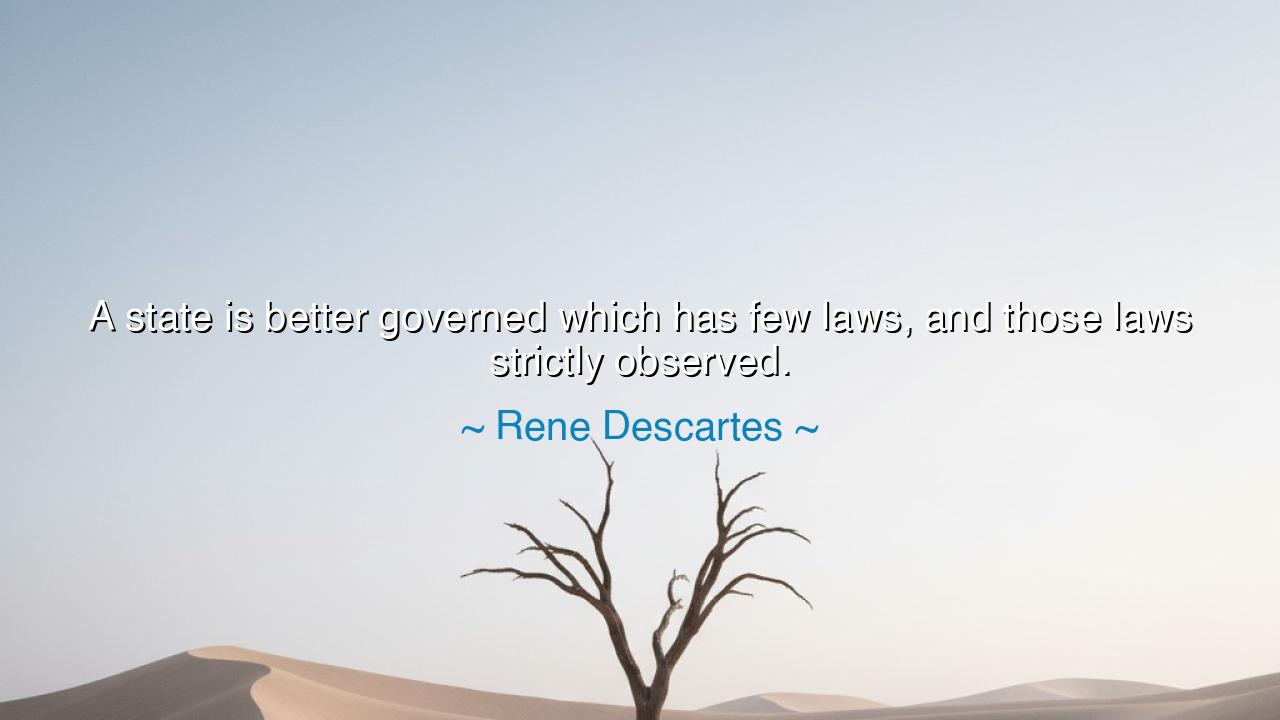
A state is better governed which has few laws, and those laws






In the quiet corridors of reason, where truth is measured not by passion but by clarity, the philosopher René Descartes once spoke a truth that still echoes through the ages: “A state is better governed which has few laws, and those laws strictly observed.” These words, born in the age of enlightenment, were not uttered in defiance but in wisdom. Descartes, who sought certainty in thought and harmony in life, saw that the strength of a nation lies not in the multitude of its decrees, but in the virtue of its order. A land burdened by countless rules is like a man weighed down by chains — unable to move, unable to breathe. But a nation guided by a few just and sacred laws, respected by all, stands firm like a mountain against the winds of chaos.
The origin of this quote rests within Descartes’ belief in simplicity, precision, and discipline — the very principles that shaped both his philosophy and his life. He was a man who sought the foundations of knowledge by stripping away all that was unnecessary, believing that truth, like a crystal, shines brightest when it is clear and unclouded. Likewise, he saw government as a structure that must be built upon the clarity of law, not the confusion of excess. In the 17th century, when kings ruled by whim and bureaucracies multiplied without purpose, Descartes recognized that too many laws invite corruption and weaken respect for authority. For when every act is regulated, no law holds meaning; when every rule is bent, none can be obeyed.
Through the ages, this truth has been proven again and again. Consider the Roman Republic, whose early strength was born from simplicity. Its laws were few but sacred — inscribed upon bronze tablets, known as the Twelve Tables, that every citizen could see and know. These laws were clear, their enforcement firm, and for centuries they bound together the mighty republic in justice and stability. But as Rome grew vast and rich, so too grew its laws. Edicts upon edicts, decrees upon decrees, until the citizens could no longer know what was lawful and what was not. Judges could interpret as they pleased; politicians bent the law to serve their ambition. The rule of law became a tool of power — and the empire, once ruled by reason, fell into the hands of despotism. The lesson was immortal: a nation that multiplies laws multiplies injustice.
Descartes’ insight also speaks to the moral character of both rulers and the ruled. For laws, no matter how wise, are but empty words if they are not observed. A government that enacts a thousand regulations but enforces none teaches its citizens to treat all law with contempt. Yet when the law is few, clear, and just — when each man knows it, and the rulers uphold it with integrity — then obedience becomes not a burden, but a virtue. The people respect authority not from fear, but from understanding. Such governance breeds peace, for it aligns human conscience with civic duty. The law ceases to be a whip, and becomes instead a guiding star.
History bears another example, luminous and instructive: the founding of the United States of America. The framers of its Constitution understood, perhaps unknowingly, the spirit of Descartes’ wisdom. They crafted not an endless code of laws, but a short and living charter, setting forth simple principles — liberty, justice, equality before the law. From these few laws, entire institutions grew; from these few truths, a nation endured. Yet even this system, when burdened by too many rules and statutes, begins to falter. The more laws are written, the more loopholes are found; the more complex justice becomes, the more it eludes the common man. Thus, the founders’ simplicity, like Descartes’ clarity, remains a lesson yet unheeded.
But Descartes’ words are not merely for kings or lawmakers — they are for every soul who governs himself. For what is a nation but the reflection of its people? The man who lives by few principles, and lives by them truly, is stronger than the man who knows a thousand virtues but follows none. Simplicity in rule mirrors simplicity in life. When our hearts are governed by honesty, discipline, and mercy — when we hold fast to what is right and forsake the clutter of excuses — then we, too, become well-governed. The wisdom of the state begins in the wisdom of the self.
The lesson, then, is as eternal as it is urgent: seek clarity over complexity, justice over abundance. Do not demand more laws, but demand better ones — and live as though your example were itself a law for others. The strength of governance lies not in the power to command, but in the restraint to rule wisely. When citizens respect the law, and when rulers live under it as servants of justice, then the land knows peace. And where peace reigns, prosperity and virtue follow as sure as dawn after darkness.
So remember the words of René Descartes, the master of reason: “A state is better governed which has few laws, and those laws strictly observed.” Let them be a lamp to every ruler and a mirror to every citizen. For a nation’s greatness is not measured by the thickness of its law books, but by the strength of its obedience to truth. Govern yourselves with wisdom, and your nation will stand unshaken; let your laws be few, just, and sacred — and you will have built not only a state, but a civilization worthy of eternity.






AAdministratorAdministrator
Welcome, honored guests. Please leave a comment, we will respond soon